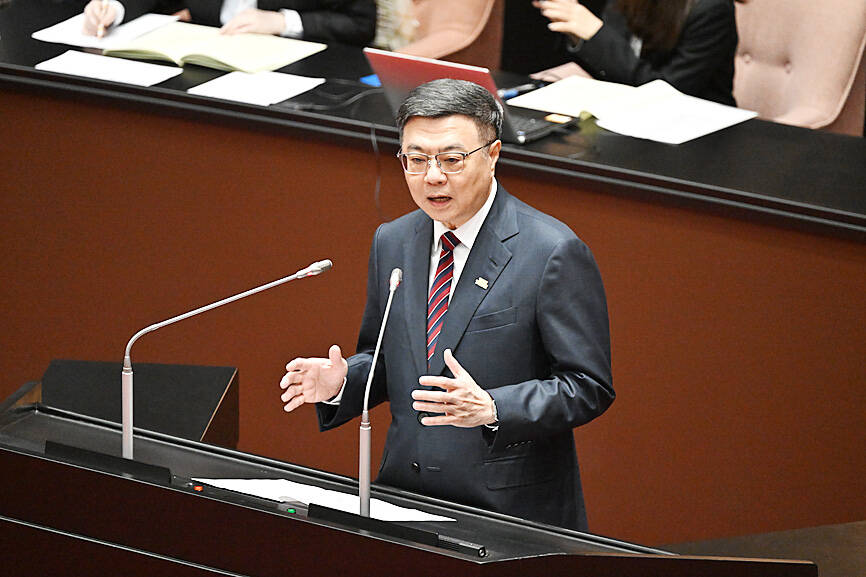Premier Cho Jung-tai (卓榮泰) yesterday told lawmakers that Taiwan currently “does not have the capacity” to spend 10 percent of the nation’s annual GDP on national defense.
“It is impossible [for the government] to allocate more than NT$2 trillion [US$60.68 billion] for defense spending, given the current scale of the central government budget,” Cho said at the Legislative Yuan in Taipei.
The central government’s budgets for last year and this year are nearly NT$3 trillion each, with social welfare accounting for the largest expenditure.

Photo: George Tsorng, Taipei Times
The premier was responding to questions from Chinese Nationalist Party (KMT) caucus whip Fu Kun-chi (傅?萁) about how the government would react if the US were to tell Taiwan to increase its defense budget to 10 percent of GDP.
Fu said 10 percent would be NT$2.68 trillion, based on the government’s GDP forecast of NT$26.88 trillion for this year.
US President Donald Trump had touched upon this topic during his presidential campaign, saying Taiwan should raise its defense spending to as much as 10 percent.
The calls were renewed earlier this month by Trump’s pick for undersecretary of defense for policy Elbridge Colby at his US Senate confirmation hearing.
Trump “has made the same demand [for defense budget increases] not only of Taiwan, but also of many other countries,” Cho said.
“At present, the Republic of China does not have the capability to allocate a defense budget of NT$2.6 trillion,” he said, adding that the budget would be determined based on the country’s financial capacity and military needs.
The Cabinet had earmarked NT$647 billion for defense spending this year, equal to 2.45 percent of GDP, some of which was later cut or frozen by the opposition-controlled legislature.
President William Lai (賴清德) later pledged to propose a special budget to raise defense spending to more than 3 percent of GDP, but that would also require legislative approval.
Asked about the budget surplus, Cho said that the surplus last year stood at NT$300 billion and should be used on national defense, public welfare and social care.
Cho was responding to comments by Democratic Progressive Party (DPP) Legislator Chung Chia-pin (鍾佳濱), who said that in 2022, during the COVID-19 pandemic, the government used NT$100 billion of the surplus to subsidize the National Health Insurance Fund, the Labor Insurance Fund, Taiwan Power Co, student loans and the TPass program, and another NT$141.7 billion as payouts of NT$6,000 each to all taxpayers.
Chung asked if it was possible for the government to do it again, focusing this time on helping medical personnel.
He also asked if the government would consider reducing taxes for fiscal 2025 after conducting actuaries, debt payouts, and new programs using the surplus from last fiscal year.
Tax reduction is a very delicate matter and, if undertaken, should benefit all citizens in a fair manner, Cho said, adding that the government has endeavored to create new tax-deductible items each year to reduce the burden on the public.
Cho said the NT$130 billion budget that was frozen by the legislature for fiscal 2025 far exceeded the amount frozen in previous years, adding that unfreezing the budget was also more complex.
The nation cannot afford such delays to its development and infrastructure plans, Cho said.
DPP Legislator Wang Ting-yu (王定宇) asked about the NT$8.4 billion — including NT$5.1 billion for equipment procurement and upgrades, and NT$2 billion for overseas travel and training — in national defense funding slashed by KMT and Taiwan People’s Party legislators.
Wang also asked about the NT$89.94 billion frozen from the Ministry of National Defense’s NT$476 billion budget for administrative fees, 30 percent of which was for fuel and munition requisition.
Minister of National Defense Wellington Koo (顧立雄) said that all funding reductions include a “cannot be diverted for other uses” restriction on the funds, making it impossible for the ministry to make internal adjustments.
Furthermore, previous funding freezes could be lifted with just a report forwarded to the legislature, but the freeze on administrative fees this time required the ministry to make an in-person report at the legislature, and can only be lifted after the legislature’s approval, Koo said.

A strong continental cold air mass is to bring pollutants to Taiwan from tomorrow, the Ministry of Environment said today, as it issued an “orange” air quality alert for most of the country. All of Taiwan except for Hualien and Taitung counties is to be under an “orange” air quality alert tomorrow, indicating air quality that is unhealthy for sensitive groups. In China, areas from Shandong to Shanghai have been enveloped in haze since Saturday, the ministry said in a news release. Yesterday, hourly concentrations of PM2.5 in these areas ranged from 65 to 160 micrograms per cubic meter (mg/m³), and pollutants were

Taiwan’s armed forces have established response protocols for a wide range of sudden contingencies, including the “Wan Chun Plan” to protect the head of state, the Ministry of Defense (MND) said today. After US President Donald Trump on Saturday launched a series of airstrikes in Venezuela and kidnapped Venezuelan President Nicolas Maduro, concerns have been raised as to whether China would launch a similar “decapitation strike” on Taiwan. The armed forces regularly coordinate with relevant agencies and practice drills to ensure preparedness for a wide range of scenarios, Vice Minister of National Defense Hsu Szu-chien (徐斯儉) told reporters before a

EVA Airways on Saturday said that it had suspended a pilot and opened an investigation after he allegedly lost his temper and punched the first officer several times as their plane was taxiing before takeoff at Los Angeles International Airport. According to a report published on Thursday by The Reporter, the incident occurred after the flight’s Malaysian first officer tried to warn the Taiwanese pilot, surnamed Wen (文), that he was taxiing faster than the speed limit of 30 knots (55.6kph). After alerting the pilot several times without response, the first officer manually applied the brakes in accordance with standard operating

The New Taipei City Social Welfare Department on Thursday celebrated Paralympic competitor Chen Tzu-wei (張孜維), who received last year’s national Golden Eagle award for exemplary achievement by Taiwanese with disabilities. Chen, who suffers from childhood-onset muscular dystrophy, did not attend the first award ceremony held by the Ministry of Health and Welfare in November due to illness. Chen was formally presented with the award at the department, where he gave thanks to government workers for supporting his education and livelihood, the department said in a statement. Chen was raised by the Ai-hsin Home for Persons with Disabilities in the city’s Bali District (八里)